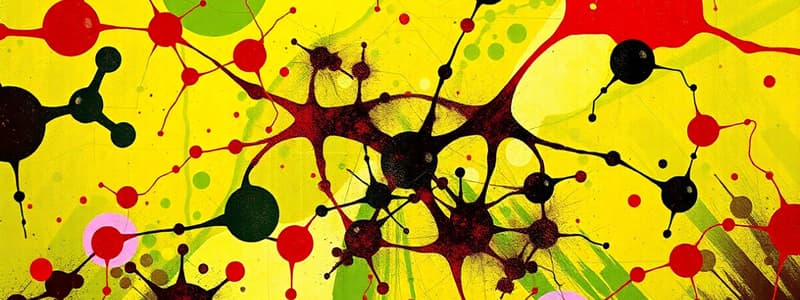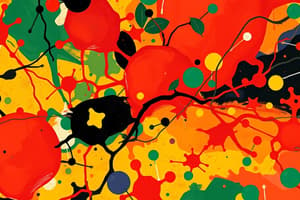Podcast
Questions and Answers
What is the focus of toxicology?
What is the focus of toxicology?
- The study of weather patterns and climate change
- The study of outer space and celestial bodies
- The study of adverse effects of chemicals on living organisms (correct)
- The study of ancient civilizations and their cultures
What is a substance that can cause illness, disease, or death when absorbed in sufficient amounts?
What is a substance that can cause illness, disease, or death when absorbed in sufficient amounts?
- Poison (correct)
- Vitamin
- Nutrient
- Mineral
From what source does a toxin originate?
From what source does a toxin originate?
- Laboratory experiments
- Synthetic chemicals
- Natural sources (correct)
- Industrial processes
What term describes toxic substances produced by human activities?
What term describes toxic substances produced by human activities?
What term describes a substance used to counteract the effects of a poison?
What term describes a substance used to counteract the effects of a poison?
Which of the following describes 'acute poisoning'?
Which of the following describes 'acute poisoning'?
What is the duration of exposure in 'subacute poisoning'?
What is the duration of exposure in 'subacute poisoning'?
What is the duration of exposure in 'subchronic poisoning'?
What is the duration of exposure in 'subchronic poisoning'?
Which of the following is a focus of clinical toxicology?
Which of the following is a focus of clinical toxicology?
Which aspect of toxicology involves medicolegal concerns?
Which aspect of toxicology involves medicolegal concerns?
Flashcards
Toxicology
Toxicology
The science that deals with poisons.
Poison
Poison
Any substance causing illness/death when absorbed.
Toxin
Toxin
Poison of natural origin (e.g., animals, plants).
Toxicant
Toxicant
Signup and view all the flashcards
Poisoning
Poisoning
Signup and view all the flashcards
Side effect (drug)
Side effect (drug)
Signup and view all the flashcards
Antidote
Antidote
Signup and view all the flashcards
Acute poisoning
Acute poisoning
Signup and view all the flashcards
Clinical toxicology
Clinical toxicology
Signup and view all the flashcards
Poisonous substance
Poisonous substance
Signup and view all the flashcards
Study Notes
- Toxicology is the science of poisons.
- Poison is any substance that causes illness, disease, or death when introduced into a living body and absorbed in sufficient amounts.
- Toxin is a poison of natural origin, such as from insects, animals, plants, and fungi.
- Toxicants are toxic substances produced by or are a by-product of anthropogenic activities like TCDD, PAH, and Arsenic.
- Poisoning is a medical condition that occurs when a poison enters a living body and causes harmful effects.
Side Effects and Poisoning
- A side effect is an undesirable result from a therapeutic drug dose.
- An antidote is a substance to remove, stop absorption, or change the properties of toxicants.
- Acute poisoning involves a large amount of poison introduced into the body, causing sudden symptoms.
- Subacute poisoning is repeated exposure to a chemical for one month or less.
- Subchronic poisoning is exposure to a chemical for 1-3 months.
- Chronic poisoning occurs when small amounts of poison accumulate in the body over a long period.
- Poisonous substances can enter the body through swallowing, injection, inhalation, skin application, or introduction into any orifice.
Applications of Toxicology
- Clinical toxicology studies clinical signs and symptoms associated with toxicants and poisoning treatments, including:
- Accidental overdosage
- Criminal overdosage
- Addictive drug overdosage
- Forensic toxicology is a hybrid of analytical chemistry and toxicological principles and is concerned with medicolegal aspects.
- Occupational (Industrial) toxicology protects workers from poisonous substances and ensures a safe working environment.
- Systemic toxicology studies the effects of toxic substances on human organs like the liver, heart, lungs, and kidneys.
- Environmental toxicology focuses on how chemical pollutants impact biological organisms in the environment.
- Ecotoxicology specializes in the impact of toxic substances on population dynamics in ecosystems, including the transport, fate, and interactions of chemicals.
- Phytotoxicology deals with plant toxins.
- Analytical toxicology analyzes chemicals and specimens.
- Formal toxicology deals with toxicokinetics, including the absorption, distribution, metabolism, and excretion of poisons.
- Experimental toxicology studies the effects of poisons in experimental animals to gain information about specific chemicals.
- Comparative toxicology compares two types or different doses of toxins.
- Geographical toxicology studies toxicity in different places (cities, villages).
- Speculative toxicology deals with suspecting poisoning in a certain area.
- Predictive toxicology predicts the harmful effects of poisons in the future, such as radiation exposure.
Toxicologists
- Toxicology studies chemicals' adverse effects on living organisms.
- A toxicologist is trained to investigate the nature of those effects, including cellular, biochemical, and molecular mechanisms of action, and to assess the probability of their occurrence.
- Toxicology principles are integral to risk assessment, providing quantitative estimates of potential health and environmental effects from chemical exposures.
- The variety of potential adverse effects and diversity of chemicals makes toxicology a broad science, leading toxicologists to specialize.
- Professional activities of toxicologists fall into three main categories: descriptive, mechanistic, and regulatory.
- A mechanistic toxicologist identifies and understands the cellular, biochemical, and molecular mechanisms of toxic effects.
- Examples of mechanistic toxicology include:
- OPs inhibiting ACHE activities
- Sweetener (saccharin) causing bladder cancer
- Thalidomide causing birth defects
- DDT affecting ion gradients in nerve axonal membranes
- 6-mercaptopurine causing hepatic toxic effects
- A descriptive toxicologist focuses on toxicity testing, which provides data for safety evaluations and regulatory requirements.
- Experimental animals are used to evaluate the risks to humans and the environment from specific chemicals like insecticides, herbicides, and solvents.
- A regulatory toxicologist decides if a drug or chemical has a low enough risk to be marketed, based on data from descriptive and mechanistic toxicologists.
- Regulatory toxicologists work for organizations such as the FDA, FDCA, EPA, and OSHA.
Classification of Poisons
- Poisons can be classified according to:
- Action as local, remote, or double
- Nature as solid, liquid, or gas
- Symptoms as stimulants or depressants
- Selective toxicity on organs as liver, kidney, or cardiac
Clinical Pictures of Poisons
- Corrosive poisoning is suspected if patches (scars) are found at the mouth and characterized as acid or alkali using litmus paper.
- Gastrointestinal irritation signs (nausea, vomiting, abdominal colic, and diarrhea) indicate metallic (e.g., arsenical) poisoning.
- Papillary changes include miosis (morphine, parathion) and mydriasis (atropine, cocaine).
- Skin changes such as wetness (cocaine, alcohol, parathion, opium), dryness (atropine), red color (CO, HCN0 and cyanosis (opium, barbiturates) may indicate poisoning.
- Characteristic breath smell occurs in opium, alcohol, phenol, and cyanide poisoning.
- Rapid pulse (atropine), slow pulse (morphine, parathion), and irregular pulse (aconitine) are indicative.
- Respiration may be rapid (atropine) or slow and stertorous (opium).
- Temperature may be raised (atropine) or low (alcohol, morphine, cocaine, parathion).
- Changes in blood pressure, nervous disorders, and abnormal vomit or stool color may occur.
- Suspected poisons in toxicological coma include phenol, alcohol, cyanide, morphine, atropine, and parathion.
- The smell of the breath, skin color, respiration, and temperature aid in diagnosing the type of coma and the nature of the poison.
Studying That Suits You
Use AI to generate personalized quizzes and flashcards to suit your learning preferences.




